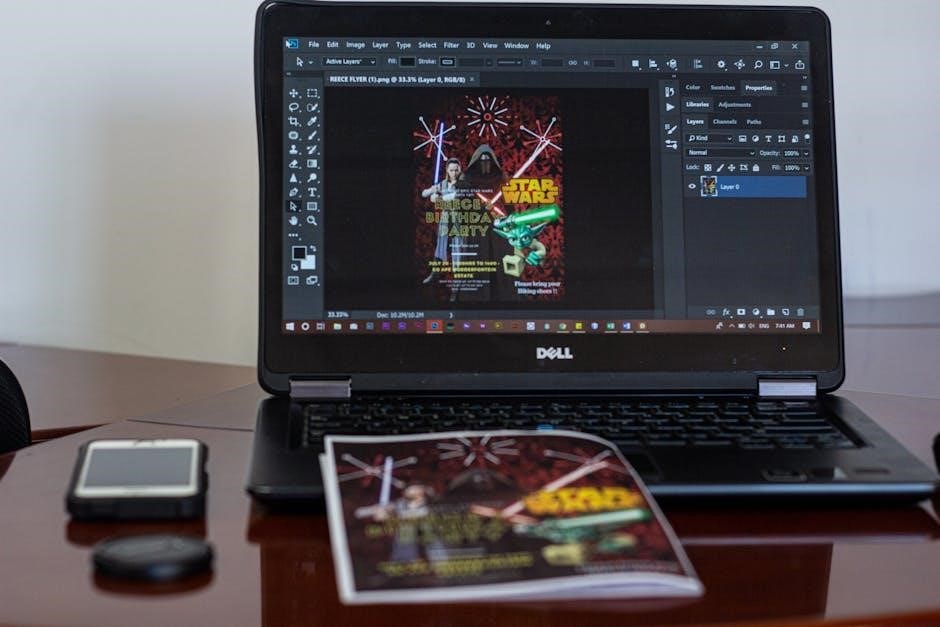Converting PDF to MSCZ enables musicians to edit sheet music in MuseScore, preserving notation accuracy․ This process involves scanning, proofreading, and exporting to MusicXML for seamless import into MuseScore․
What is MSCZ Format?
The MSCZ format is the native file format of MuseScore, a popular software for creating and editing sheet music․ It stores detailed musical information, such as notes, measures, dynamics, and layout details, enabling precise editing within MuseScore․ Unlike PDFs, which are static, MSCZ files are designed for flexibility, allowing users to modify scores directly․ They are typically based on XML, ensuring readability and compatibility․ While primarily used by MuseScore, their structure supports various musical elements, making them ideal for composers and musicians needing editable scores․ The format is widely used within the MuseScore ecosystem, offering advantages in musical data management and manipulation․
Why Convert PDF to MSCZ?
Converting PDF to MSCZ is essential for musicians and composers seeking to edit or customize sheet music․ PDFs are static and non-editable, making it difficult to make changes or adjustments․ In contrast, MSCZ files allow users to modify notes, dynamics, and layouts directly within MuseScore․ This conversion is particularly useful for recovering musical notations from scanned or downloaded PDFs, enabling further refinement or arrangement․ It also preserves the integrity of the music, ensuring accurate playback and editing․ Additionally, MSCZ files facilitate collaboration and sharing among musicians, as they can be easily edited and exported back to other formats like PDF or MP3․ This process bridges the gap between static scores and editable, interactive music files, enhancing creativity and productivity for musical projects;

Methods for Converting PDF to MSCZ

Common methods include using online converters, scanning PDFs to MusicXML and importing to MuseScore, or utilizing third-party software for direct conversion․

Using Online Converters
Online converters offer a quick and convenient way to convert PDF to MSCZ․ Simply upload your PDF file to the converter, select MSCZ as the output format, and download the result․ Many online tools support drag-and-drop functionality, making the process user-friendly․ Some platforms also allow additional features like editing or adding annotations before conversion․ However, be cautious of file size limits and ensure the converter supports music notation accurately․ For best results, choose a reputable service to maintain the integrity of your sheet music․ This method is ideal for those seeking a fast, no-installation solution for converting PDFs to MSCZ format․
Converting PDF to MusicXML and Importing to MuseScore
Converting PDF to MusicXML and importing it into MuseScore is a reliable method for achieving high-quality sheet music․ First, use a PDF-to-MusicXML converter or scanning software like Music Scanner to extract musical notation from the PDF․ This step ensures that the notes and measures are accurately captured․ Once you have the MusicXML file, open MuseScore and import it using the File > Import feature․ MuseScore will then render the notation, allowing you to edit and refine it as needed․ This method is particularly useful for preserving the structural integrity of the music, making it ideal for complex scores․ By converting to MusicXML first, you ensure compatibility and maintain the ability to make adjustments before finalizing the MSCZ file․
Using MuseScore’s Built-in Import Feature
MuseScore’s built-in import feature simplifies the process of converting PDF files to MSCZ format․ To use this feature, open MuseScore and navigate to File > Import․ Select the PDF file you wish to convert, and MuseScore will attempt to interpret and render the musical notation․ While this method is straightforward, the accuracy depends on the PDF’s quality and layout․ For complex scores, some manual adjustments may be necessary post-import․ This feature is particularly useful for users who prefer a direct, integrated workflow within MuseScore, eliminating the need for external converters․ Ensure your MuseScore software is updated for the best results, as improvements in import capabilities are regularly added․
Third-Party Software Solutions
Several third-party software tools are available to facilitate the conversion of PDF files to MSCZ format․ Programs like Music Scanner and Audiveris specialize in scanning and converting PDF sheet music into editable formats․ These tools often include OCR (Optical Character Recognition) technology to interpret musical notation and export it as MusicXML, which can then be imported into MuseScore․ Additionally, some applications offer direct PDF to MSCZ conversion, streamlining the process for users․ These solutions are particularly useful for handling complex layouts and ensuring accuracy in the conversion․ By leveraging these tools, musicians and composers can efficiently transform static PDF scores into editable MSCZ files, ready for further customization and performance․ This approach saves time and enhances productivity for those working with sheet music regularly․

Step-by-Step Guide to PDF to MSCZ Conversion
Converting PDF to MSCZ involves scanning the PDF, exporting to MusicXML, and importing into MuseScore․ This method ensures accurate notation and editing capabilities․
Preparation and Scanning of PDF Files
Preparing and scanning PDF files is crucial for accurate MSCZ conversion․ Ensure the PDF is clear and high-resolution, with proper formatting․ Use OCR tools or music scanners to recognize musical notations and export them as MusicXML․ This step is essential for maintaining the integrity of the original composition when importing into MuseScore․ Proper preparation minimizes errors and simplifies the editing process․

Proofreading and Correcting Errors
After scanning, thoroughly proofread the converted file to correct errors․ OCR tools may misinterpret notes, leading to inaccuracies․ Review the MusicXML file for missing measures or incorrect notation․ Use MuseScore’s editing tools to fix layout issues and ensure the composition matches the original PDF․ Pay attention to dynamics, articulations, and other musical markings․ This step is vital for maintaining the integrity of the music and ensuring a smooth editing experience in MuseScore․ Accurate proofreading saves time and ensures the final MSCZ file is professional and error-free․
Exporting to MusicXML and Importing to MuseScore
Once the PDF is scanned and corrected, export the file as MusicXML, a format compatible with MuseScore․ Open the scanned file in an OCR tool or music scanning software and select the export option for MusicXML․ After exporting, launch MuseScore and navigate to File > Import to upload the MusicXML file․ MuseScore will interpret the notation, allowing further editing․ Ensure the layout and notes align correctly, as some elements may require adjustment․ This step bridges the gap between the PDF and MSCZ formats, enabling seamless editing and customization in MuseScore․ Properly importing the MusicXML file is crucial for maintaining the integrity of the original composition․

Challenges and Solutions in PDF to MSCZ Conversion
Complex layouts and missing notes often pose challenges․ Using OCR tools and thorough proofreading can help address these issues, ensuring accurate conversion and preserving musical integrity․
Handling Complex Notations and Layouts

Complex notations and intricate layouts in PDF files can make conversion to MSCZ challenging․ Advanced OCR tools are often required to accurately recognize and interpret such elements․ Users may need to manually adjust layouts in MuseScore after conversion to ensure proper formatting․ Additionally, some PDFs may contain multi-page scores, which can complicate the conversion process․ Breaking down the PDF into individual pages or sections before conversion can help manage complexity․ Proofreading is essential to correct any misalignments or errors caused by the conversion process․ Utilizing software with built-in layout correction features can also streamline this task and improve overall accuracy․
Addressing Missing Notes or Measures
When converting PDF to MSCZ, missing notes or measures can occur due to poor PDF quality or complex layouts․ Using high-quality OCR tools and preprocessing the PDF by enhancing image quality or splitting it into smaller sections can improve accuracy․ After conversion, thorough proofreading using MuseScore’s editing tools is essential to identify and correct missing elements․ Comparing the original PDF with the converted MSCZ file side by side can help spot discrepancies․ If many notes are missing, re-scanning the PDF or using a different conversion method may be necessary․ Additionally, considering standalone tools or plugins that analyze MSCZ files for missing notes can save time․ Exporting to MusicXML before importing to MuseScore might also enhance handling of complex notations, reducing missing notes․ Adjusting conversion software settings to prioritize accuracy can further mitigate this issue․ Engaging with user communities for tips and workarounds can provide practical solutions to minimize missing notes, ensuring a more accurate and complete conversion process․
Converting PDF to MSCZ is a valuable process for musicians, enabling sheet music editing and enhancement․ While efficient, it may require manual cleanup for optimal results, ensuring accurate musical preservation․
Best Practices for PDF to MSCZ Conversion

When converting PDF to MSCZ, start by ensuring your PDF is high-quality and clearly formatted․ Use reliable tools like Music Scanner or pdfFiller for accurate conversions․ Always proofread the output in MuseScore to correct any errors or missing notes․ Exporting to MusicXML as an intermediate step can help maintain notation integrity․ Regularly update your software to access the latest features and improvements․ For complex scores, consider manual adjustments to preserve the original intent․ Lastly, save your work frequently to avoid data loss and ensure a smooth editing experience in MuseScore․
